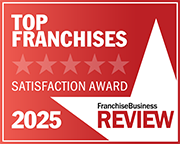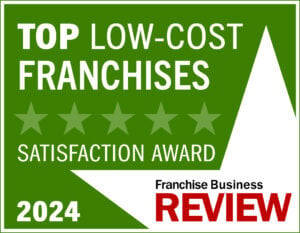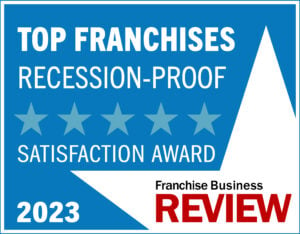Buying a Franchise vs Building Your Own Business
Building your own successful business is the ultimate entrepreneurial dream. But with a startup business failure rate approaching 90%, it’s an intimidating prospect.
Buying a franchise can alleviate some of the risks, but it’s also not a one-size-fits-all situation. There are distinct advantages and disadvantages to consider before deciding the right path for you. Let’s take a look.

To buy or to build
When comparing the idea of buying a franchise to starting your own business, several key differences emerge, most notably in the areas of brand recognition, support systems, and financial investment and risk.
Franchises often provide immediate brand recognition and a proven business model, which can significantly reduce the risks associated with starting a new business. For example, according to the International Franchise Association, franchises have a higher success rate compared to new businesses, with more than 90% of U.S. franchises still operating after five years, compared to about 50% of independent businesses.
In terms of support, franchisors offer extensive training programs, operational support, and marketing strategies, which can be invaluable for new entrepreneurs. A franchisee can benefit from the franchisor’s experience and avoid many of the mistakes that independent business owners might make.
This is especially evident when looking at the highest revenue franchises in the US by Franchise Clues, which showcases the benefits of franchisors’ robust support systems. Such support can lead to more efficient operations and effective marketing, giving franchisees a competitive advantage. Additionally, the established reputation of top franchises makes it easier to attract customers and increase revenue potential. So while the initial investment may be higher, the potential for long-term profitability and stability often outweighs the cost.
However, the financial investment required to buy a franchise can be significantly higher than starting an independent business.
Franchise fees, ongoing royalties, and adherence to franchisor-imposed standards can add up. Despite these costs, the financial performance of franchises can be compelling. A report by Franchise Business Review noted that the average annual income of franchise owners is $80,000, suggesting a potentially lucrative return on investment.
Independent business ventures offer more control and the freedom to innovate, but come with higher risk and require more effort to build brand recognition and customer trust from scratch.
In the end, you’ll need to weigh the options and decide for yourself. Let’s jump in.
5 advantages and disadvantages of buying a franchise
Different franchise opportunities will offer their own set of unique benefits, but in general, the franchise model comes with a consistent set of benefits and drawbacks.
Advantages
Buying a franchise offers several advantages that can be attractive to entrepreneurs.
- Established Brand Recognition: Franchises often come with established brand names that are well-recognized by consumers. This can significantly reduce the time and resources needed to build brand awareness compared to starting a new business from scratch. An existing customer base can lead to quicker profitability for franchisees.
- Proven Business Model: Franchisors typically provide franchisees with a proven track record that has been successful in multiple locations. This includes standardized processes, operational procedures, and marketing strategies that have been tested and refined over time. Having a successful business model can lower the risk of business failure and increase the likelihood of profitability.
- Training and Support: Franchise systems often offer comprehensive training programs and ongoing support to franchisees. This may include initial training on operating the business, ongoing training for employees, assistance with marketing and advertising, and access to support resources such as manuals, online portals, and dedicated support staff. The support provided by the franchisor can help franchisees navigate challenges and maximize their chances of success.
- Economies of Scale: Franchise systems benefit from economies of scale, which can lead to cost savings for franchisees. This includes bulk purchasing power for inventory and supplies, access to negotiated discounts and favorable terms with suppliers, and shared marketing expenses across the franchise network. These cost advantages can help franchisees operate more efficiently and improve their bottom line.
- Community and Networking: Franchise systems often foster a sense of community among franchisees, providing opportunities for networking, collaboration, and knowledge sharing. Franchisees can learn from each other’s experiences, share best practices, and offer support and advice. This sense of camaraderie can be valuable for new franchisees who may benefit from the collective wisdom and support of their peers.
Disadvantages
While buying a franchise can offer tremendous advantages, it’s important to consider potential drawbacks as well.
- High Initial Investment: Purchasing a franchise typically requires a significant upfront costs, which can include franchise fees, startup costs, and initial inventory or equipment purchases. Additionally, ongoing royalty fees and other expenses can further add to the financial burden. This high initial investment can be a barrier for some prospective franchisees, especially those with limited capital or access to financing.
- Lack of Flexibility: Franchise agreements often come with strict rules and guidelines that franchisees must follow regarding everything from business operations to marketing strategies to product offerings. While these standardized processes can contribute to the success of the franchise system as a whole, they can also limit the flexibility and autonomy of individual franchisees. Franchisees may have limited control over certain aspects of their business and may be required to adhere to corporate mandates even if they believe local adaptations would be more effective.
- Dependency on Franchisor: Franchisees rely heavily on the franchisor for ongoing support, guidance, and resources. However, if the franchisor fails to fulfill its obligations or experiences financial difficulties, franchisees may suffer as a result. Changes in corporate leadership, strategic direction, or market conditions can also impact franchisees’ businesses, sometimes without their input or control.
- Royalty Fees and Profit Sharing: Franchise agreements typically require franchisees to pay ongoing royalty fees and potentially other types of fees or profit-sharing arrangements. These fees are often based on a percentage of revenue or profits and can cut into franchisees’ profitability. While these fees are intended to cover the costs of ongoing support and access to the franchise system, they can be a significant expense for franchisees, particularly during periods of slow business or economic downturns.
- Limited Territory and Market Saturation: Franchise agreements often grant franchisees exclusive or semi-exclusive territories within which to operate. While this can provide some level of protection from direct competition from other franchisees within the same system, it can also limit growth opportunities, particularly in highly competitive or saturated markets. Franchisees may find themselves unable to expand their business or reach new customers outside of their designated territory, potentially stifling long-term growth prospects.
5 advantages and disadvantages of starting your own small business
Being your own boss is a tantalizing idea, but even the most optimized of business plans doesn’t guarantee success. Here are some advantages and disadvantages to keep in mind.
Advantages
Starting your own business offers numerous advantages that can be appealing to entrepreneurs.
- Creative Freedom and Control: When you start your own business, you have the freedom to develop your own vision, mission, and brand identity. You can create innovative products or services, establish your own company culture, and make decisions without having to answer to corporate management or adhere to franchise rules. This creative freedom allows you to shape your business according to your own values, interests, and priorities.
- Potential for Unlimited Earnings: Unlike salaried employees who have fixed incomes, entrepreneurs have the potential to earn unlimited profits from their business ventures. Successful businesses can generate significant revenue and profits, which can lead to substantial financial rewards for their owners. Entrepreneurial endeavors also offer the opportunity to build equity and wealth over time, as the value of the business grows through expansion, innovation, and market demand.
- Flexibility and Work-Life Balance: One of the most attractive aspects of entrepreneurship is the flexibility it offers in terms of scheduling and work-life balance. As a business owner, you have the flexibility to set your own hours, work from anywhere, and prioritize your personal and professional responsibilities according to your needs and preferences. While entrepreneurship often requires hard work and dedication, it also allows you to design a lifestyle that aligns with your goals and priorities.
- Personal Fulfillment and Satisfaction: Building and growing your own business can be deeply fulfilling on a personal level. Entrepreneurship allows you to pursue your passions, utilize your skills and expertise, and make a positive impact on your customers, employees, and community. The sense of accomplishment that comes from overcoming challenges, achieving milestones, and seeing your vision come to life can be immensely satisfying and rewarding.
- Opportunity for Growth and Innovation: Entrepreneurship is inherently dynamic and offers ample opportunities for growth, innovation, and learning. As a business owner, you have the freedom to experiment with new ideas, explore emerging markets, and adapt to changing trends and technologies. Entrepreneurial ventures often thrive on innovation and disruption, allowing you to stay ahead of the competition and carve out a unique niche in the marketplace. This constant evolution and opportunity for growth can make entrepreneurship both exciting and fulfilling.
Disadvantages
Starting your own business can be rewarding, but it also comes with its share of challenges and disadvantages. Here are five top disadvantages:
- Financial Risk and Uncertainty: Entrepreneurship involves a significant amount of financial risk, as there are no guarantees of success. Many businesses fail within the first few years, leaving entrepreneurs with financial losses and debt. Starting a business often requires a substantial upfront investment, and there’s no certainty of when or if the business will become profitable. Additionally, entrepreneurs may need to forgo a steady paycheck and financial stability during the initial stages of building their business.
- Long Hours and High Stress: Running a business requires a tremendous amount of time, effort, and dedication. Entrepreneurs often find themselves working long hours, including evenings and weekends, to get their business off the ground and keep it running smoothly. This can lead to high levels of stress, burnout, and strain on personal relationships. Balancing the demands of entrepreneurship with other aspects of life can be challenging, especially during periods of growth or crisis.
- Limited Resources and Support: Unlike established companies or franchises, new businesses often lack access to resources, infrastructure, and support systems. Entrepreneurs may struggle to secure funding, attract top talent, or access essential services such as marketing, legal, or accounting support. Building a network of contacts, mentors, and advisors can be crucial for navigating the challenges of entrepreneurship, but it can take time and effort to cultivate these relationships.
- Uncertain Market Conditions and Competition: Entrepreneurs must navigate a constantly changing marketplace with evolving consumer preferences, technological advancements, and competitive pressures. Market conditions can be unpredictable, and new businesses may face stiff competition from established players or disruptive startups. Entrepreneurs must continuously monitor industry trends, adapt their strategies, and differentiate their offerings to stay relevant and competitive.
- Legal and Regulatory Compliance: Starting and operating a business involves complying with various legal and regulatory requirements at the local, state, and federal levels. Entrepreneurs must navigate complex laws and regulations related to business formation, licensing, taxation, employment, intellectual property, and more. Failure to comply with these requirements can result in fines, lawsuits, or even the closure of the business. Managing legal and regulatory compliance can be time-consuming and costly, especially for entrepreneurs with limited legal expertise or resources.
The Fibrenew way might be right for you
Even if buying a franchise, remember that you are still building something of your own, just with some of the risk taken off your back. You still have the freedom to build your business and enjoy every return and bit of success you achieve.
We can’t claim to know exactly what the right path for every individual might be. But what we are completely confident in is our business model and system giving our franchisees monumental opportunity to succeed. After all, we treat our franchise partners like family.
And get this: we only charge a flat monthly fee. No royalties.
Mic drop.
Check out our free Franchise Information Report for everything you need to know. Until next time!
Buying a franchise vs starting your own business FAQ
What is the main difference between buying a franchise and starting my own business? When you buy a franchise, you’re essentially purchasing the rights to use an established brand name, business model, and operational system. Starting your own business involves creating a brand and business model from scratch. Which option typically requires a larger initial investment? Buying a franchise often requires a larger initial investment compared to starting your own business. Franchise fees, initial setup costs, and ongoing royalties can add up significantly. Starting your own business allows more flexibility in terms of initial investment, but it still requires capital for startup costs. What are the advantages of buying a franchise? Buying a franchise offers advantages such as brand recognition, a proven business model, training and support from the franchisor, economies of scale, and access to a network of fellow franchisees for support and collaboration. What are the advantages of starting my own business? Starting your own business provides creative freedom and control over your brand and operations, potential for unlimited earnings, flexibility in work hours and lifestyle, opportunities for personal fulfillment and satisfaction, and the ability to innovate and adapt to market changes more freely. Which option offers more autonomy and control over business decisions? Starting your own business typically offers more autonomy and control over business decisions compared to buying a franchise. Franchise agreements often come with strict rules and guidelines that franchisees must follow, limiting their flexibility in decision-making. Which option carries more risk? Both buying a franchise and starting your own business involve risks. However, buying a franchise may offer a more predictable business model with lower risks associated with brand recognition and support from the franchisor. Starting your own business carries the risk of market acceptance, competition, and the challenges of building a brand from scratch. Which option offers more support and guidance for new entrepreneurs? Buying a franchise typically offers more support and guidance for new entrepreneurs, including initial training, ongoing support from the franchisor, and access to established systems and processes. Starting your own business requires entrepreneurs to rely more on their own resources and networks for guidance and support. Can I convert my own business into a franchise later on? Yes, it’s possible to convert your own business into a franchise later on if it meets certain criteria and has demonstrated success. However, the process can be complex and requires careful planning, legal considerations, and investment in developing a franchise system. Which option is better for someone with limited business experience? Buying a franchise may be a better option for someone with limited business experience since it provides a proven business model, training, and ongoing support from the franchisor. Starting your own business requires more entrepreneurial skills and may involve a steeper learning curve. How can I determine which option is right for me? Consider factors such as your financial resources, risk tolerance, level of entrepreneurial experience, personal preferences, and long-term goals when deciding between buying a franchise and starting your own business. Research and due diligence are crucial in making an informed decision that aligns with your strengths and aspirations.








